Tasmanian tourism developer Brett Torossi truly at top of her game
YOUR TASWEEKEND READ: WHETHER it’s getting her latest property development over the line or making time to promote the local art scene, there’s no stopping Brett Torossi.
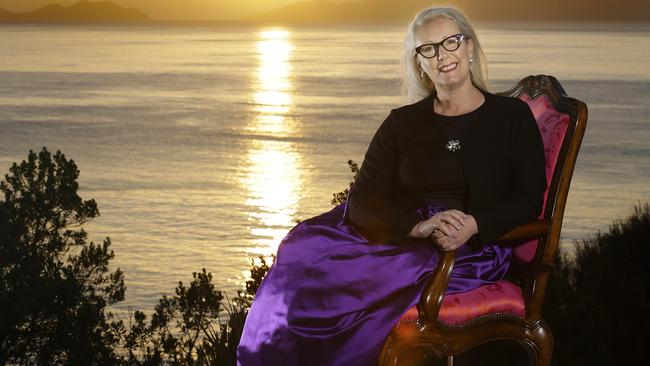
Tasmania
Don't miss out on the headlines from Tasmania. Followed categories will be added to My News.
WHETHER it’s getting her latest property development over the line or making time to promote the local art scene, there’s no stopping Brett Torossi.
And the Tasmanian Tourism Champion’s latest project could be the biggest game-changer of all
Property developer Brett Torossi does not take “no” for an answer.
She has an ability to make crazy things happen, whether it is placing an apartment atop a high-rise office block, transporting an old church hall to a hillside bush retreat or simply overcoming Tasmania’s notoriously convoluted building compliance processes and culture of resistance.
“I’ve noticed over the years that the default position in Tasmania is ‘no’,” Torossi says. “Boy, have I met a lot of people who like saying ‘no’. But I love that bit, I really do. I find great energy in [overcoming] that.”
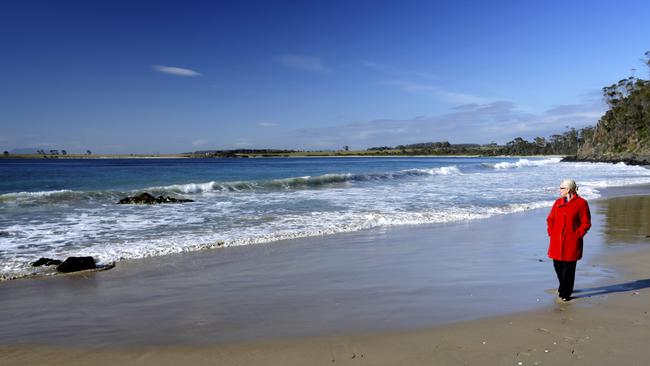
Torossi hardly sleeps and, in her own words, tends to “go hard”, striving to achieve as much as she can in one lifetime.
Immaculately composed, yet bubbling with creativity and passion, Torossi’s long blonde hair and classic, colourful clothes frame a mind that is constantly dreaming up new ideas.
When she meets TasWeekend over several pots of English Breakfast tea (EBT as she calls it), Torossi has only been back in the state a day and has already met with a government minister and attended a Tasmanian Museum and Art Gallery (TMAG) trustees meeting.
The following day she is due in Launceston for a community open day for her $130 million 500-lot residential development, the Green, at Rocherlea.
Then she is off again to Sydney, where she has a small abode, before returning to Hobart in time for another board meeting and artist Max Angus’ 100th birthday celebrations. “I couldn’t miss that,” Torossi says.
Friends and family - Torossi has two adult sons and two grandchildren - get high priority (she has a Skype date every Sunday with her four-year-old grandson Max, who lives in London) but Torossi admits her busy brain “drives some people a little spare”.
“That’s what happens when you try to squeeze five lifetimes into one,” she says. “Sometimes I’m awake at 4.30am. I only need about four or five hours sleep.”
“Everything she does she throws herself into 100 per cent. She’s always thinking outside the box.”
About 14 years ago she learned to meditate, which may sound whimsical but is in fact another example of the efficient way in which Torossi operates.
“The more I meditate the calmer my internal world feels and the less I need to sleep,” she says.
She prefers to work with pen and paper rather than on a computer, filling pages of a thick hardback notebook with her tiny perfect longhand.
Torossi tells TasWeekend she is about to lodge an expression of interest under the State Government’s scheme to allow lowimpact, “sensitive” development in Tasmania’s national parks.
She gives little away, but says it will be a “place for celebration”.
“It’s sweet and small - small in scale, big in its idea, big in its love and big in care for its execution,” Torossi says.
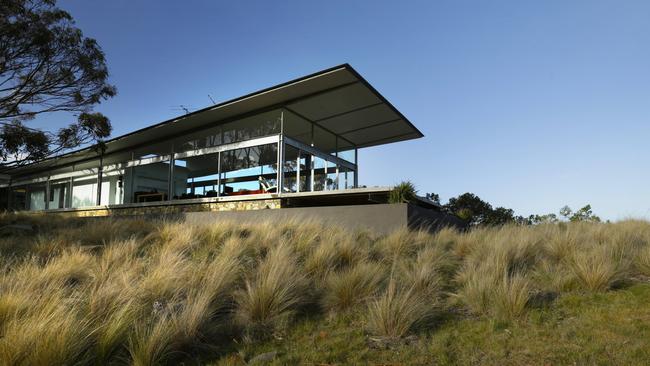
Torossi lives in an Art Deco house in Sandy Bay with her partner Brian Jones, whom she met at a leadership conference six years ago.
He works in the power sector and is currently in India overseeing the construction of components for a power station in New Caledonia.
From Sydney originally, she fell in love with Tasmania when one of her two sisters moved down more than 20 years ago (all three sisters now live in Hobart).
Torossi, who has been a developer since 1980, was one of the first to create a truly high-end accommodation experience in Tasmania, starting with Avalon Coastal Retreat, near Swansea, on the East Coast in 2004 and then Rocky Hills Retreat, hidden in nearby bushland.
But it looks to be Torossi’s most recent development, the Avalon City Retreat, an “omnipod” perched on top of a Hobart office building, that will prove to be the biggest game-changer in the property industry.
As a model for future development it has the potential to unleash prime real estate in Australia’s most expensive and space-poor cities.
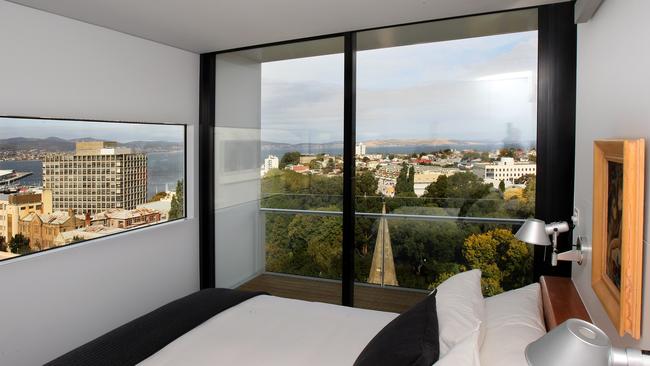
Last night, Torossi was awarded the Tasmanian tourism industry’s highest individual honour when she was named 2014 Tasmanian Tourism Champion.
TASMANIAN TOURISM AWARDS: ICON ROB LANDS A WHOPPER
At the gala dinner at Wrest Point, Torossi was acknowledged for “introducing a new market for luxury retreat accommodation to Tasmania” and her personal contribution to the industry, including as long-standing patron of the Festival of Voices.
Tourism Industry Council Tasmania chairman Simon Currant describes Torossi as “both a visionary and a realist”.
“Her personal commitment to quality and excellence in tourism is self-evident when you visit one of her amazing retreats, which just ooze sophistication, elegance and style, which are all incidentally, also the hallmarks of Brett as a person,” Currant says.
“She has a tremendous commercial head on her shoulders, but also the capacity to think outside the square.”
Those comments are echoed by builder Michael Lane, who was engaged by Torossi to make her idea of a house on top of a building a reality.
“Everything she does she throws herself into 100 per cent,” Lane says. “She’s always thinking outside the box.”
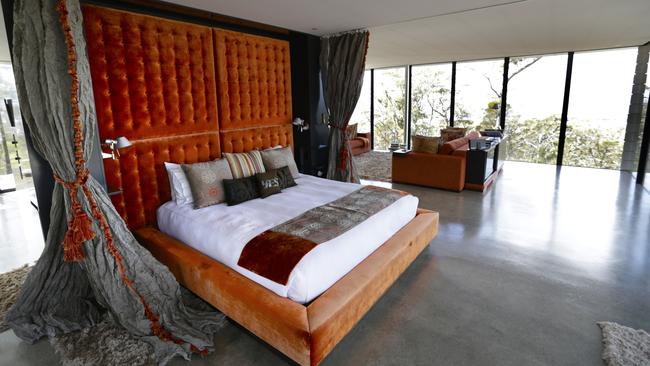
In the industry Torossi is known for the time, energy and research she puts into getting her concepts and designs right, working out risks and resolving problems before they eventuate.
“She’s always willing to consider new ways of doing things,” Lane says.
Torossi reveals she and Lane plan to export omnipods to Sydney, taking advantage of millions of dollars worth of as yet unrealised rooftop real estate.
“It’s a beautiful business case but we’ve got to carve out some time to put our heads in that space before we can say we’re ready to move on it,” Torossi says.
She has identified about 30 high-rise buildings in Sydney she says would be a perfect fit for an omnipod penthouse.
When Torossi first told friends and family she wanted to build on top of an existing high-rise they probably thought it was just another of her many “out there” ideas, like the dream to overhaul the role of Hobart’s parking inspectors (we’ll get back to that one later).
But Torossi had long been musing on the potential of transportable modular buildings when she noticed a 1960s office block overlooking Hobart’s St David’s Park.
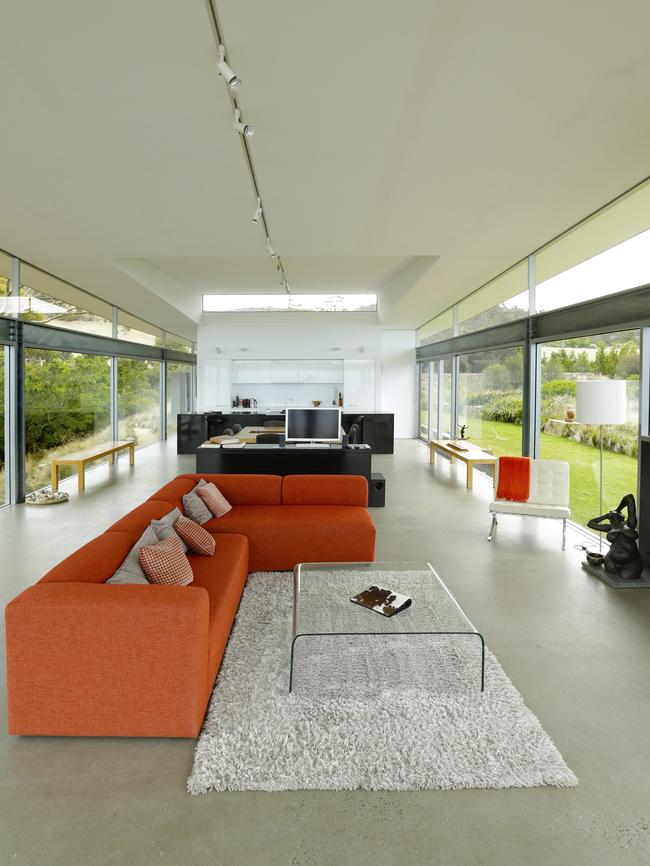
“I was sitting in St David’s Park for a few minutes, probably talking to someone on the phone and I thought, ‘Wow, what about that building there, it’s got a great aspect, it’s got great bones’,” Torossi recalls.
She approached the building owners to buy the rooftop part of the building.
“I found out I couldn’t buy the roof space but I could buy the whole building so I got together with some colleagues and we bought the building,” Torossi says.
Buying an entire office building to gain access to the roof is similar to how Torossi came to own a large farming property on the East Coast.
She drove up and down the coast scouting for locations for what would become Avalon Coastal Retreat. She honed in on the ideal site and the farmer who owned the land near Swansea agreed to sell, but only if she took the whole farm.
Always one to embrace an opportunity Torossi again engaged Hobart architect Craig Rosevear to design Rocky Hills Retreat on a rugged section of her new “farm”. The artist studio next door for guests to use is an old church hall saved from the side of the Brooker Highway at Derwent Park. It was to be demolished to make way for units but Torossi, in true “think outside the square” style, had it “flat-packed”, reassembled on site and lovingly restored.
Torossi is often approached by other people for business advice, which she is often happy to dispense. And she also has some advice for Hobart’s civic leaders about revamping the role of parking inspectors.
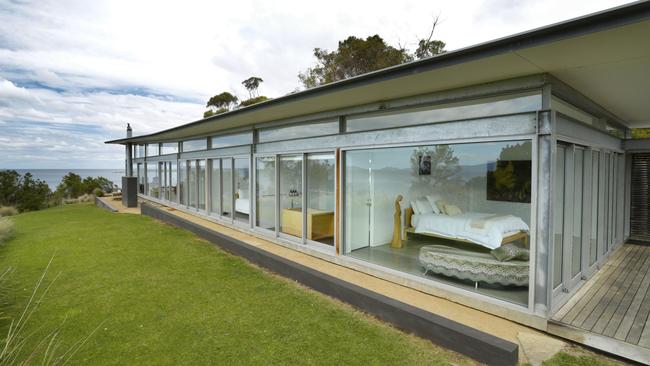
“What if the parking tickets still contained all the regulatory requirements but every month we commission a Tasmanian artist to design an amazing work that is produced on the ticket?” Torossi asks.
She suggests the council gives $2 from each fine to a non-profit organisation, thereby helping the community while creating a quirky new talking point in the city.
“As a recipient of many a parking ticket I would probably be happier about collecting a work of beauty, I will no doubt collect the whole set,” Torossi says cheekily.
As she dreams up everyday ways to make the world better, Torossi also juggles her myriad commercial, residential and tourist operations and roles on various boards.
She reveals the 10-year plan for the office block she now owns at 152 Macquarie St is to take off the omnipod and build four new storeys of luxury accommodation with a rooftop pool.
The pod itself could be relocated or placed back on top.
“That’s the beauty of it, it can go anywhere,” Torossi says.
She has been on the Tasmanian Development Board since 2006 and acting chair for the past three months.
I put myself in other people’s shoes and think, ‘What are the impacts on other people, other businesses?’ and I work through as creatively as I can what I might need to deal with and I go and talk to them.
She is also a commissioner with the Tasmanian Planning Commission, a TMAG trustee, the chair of Tourism Tasmania’s finance committee and a director of Wallis Watson Capital, which is a partner in some of her housing developments including the Green in Launceston.
“That’s going along well, we’ve got 10 families coming to make it their new home over the next few months,” Torossi says of the Rocherlea estate, where every plant and tree will be edible.
The Green will be Tasmania’s largest residential development, yet there were no community objections and it received unanimous council support. “Because we talked to everybody,” Torossi says.
“I put myself in other people’s shoes and think, ‘What are the impacts on other people, other businesses?’ and I work through as creatively as I can what I might need to deal with and I go and talk to them.”
It may seem simple but an ability to genuinely talk with the community and get people on board is something so many developers have failed to master in Tasmania, only to be blindsided after spending millions on planning by the full wrath of a community that feels it is being bullied.
One of Torossi’s favourite mottos is “if you can’t fix it, feature it” and in her mind it is the “differences and the contrasts that make Tasmania interesting as a place and destination”.
With Tasmania riding high on Richard Flanagan’s Man Booker Prize win and the state’s inclusion in Lonely Planet’s top 10 destinations for 2015, Torossi believes the political and cultural divide over issues such as forestry will help keep outsiders interested in the long run.
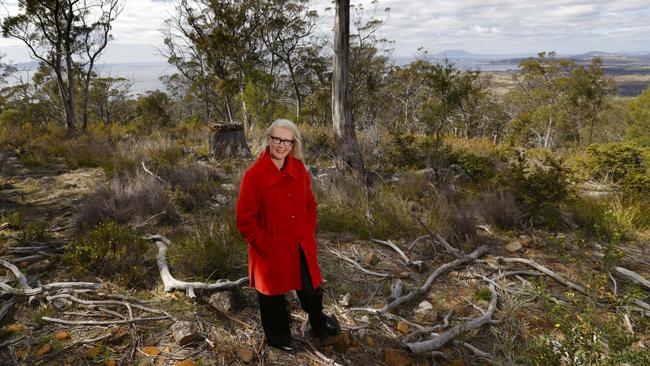
“This is a terrible thing to say but this is part of what really makes us intriguing as a destination,” she says.
“We are a place full of contradictions. It’s a place that has depth. You can’t explain Tasmania in the same way that you can explain Queensland with an image of the sun and the beach.
“Tasmania is seductive, it’s beautiful, it’s dark, it’s got huge depth to its creative communities, it’s got amazing innovation and it’s got crazy characters in it.”


